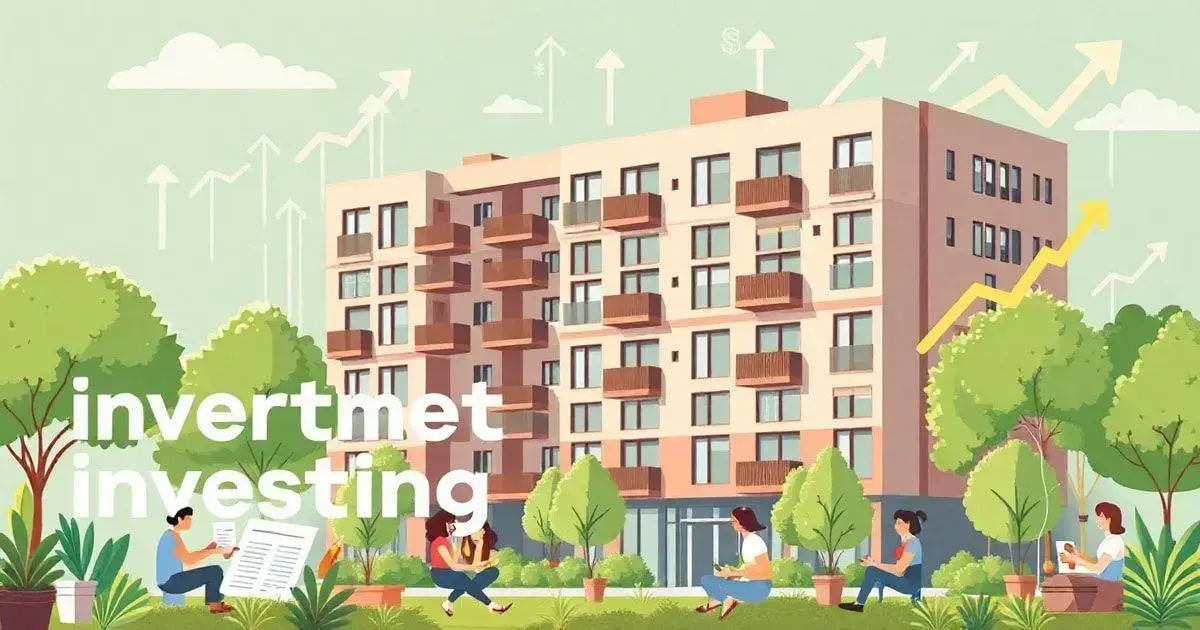Understanding Real Estate Investment Basics
Understanding real estate investment basics is essential for anyone looking to make informed decisions in this field. How to invest in apartment buildings is one of the most popular paths for many real estate investors, as it offers steady cash flow and long-term appreciation.
Real estate investments generally fall into two categories: residential and commercial. Residential properties include single-family homes, apartments, and vacation rentals, while commercial properties encompass office buildings, retail spaces, and industrial sites.
Investors should familiarize themselves with key concepts such as cash flow, which is the net income generated from a property after all expenses are deducted. Additionally, the return on investment (ROI) is crucial when assessing the profitability of a property. It looks at the yield from an investment relative to its cost.
Another important factor is location, which can significantly influence property values and rental demand. An area with good schools, amenities, and transportation options generally attracts tenants, making it a prime spot for investment.
Understanding market trends and property evaluations is also vital; thorough due diligence can prevent poor investment choices.
Finally, potential investors should be aware of financing options, regulatory requirements, and the importance of property management when investing in apartment buildings. These foundational aspects will prepare you for a successful journey in real estate investment.
Benefits of Investing in Apartment Buildings

How to invest in apartment buildings offers several benefits that make it an attractive option for many investors. One of the primary advantages is steady cash flow. Rental income from multiple units can provide a consistent revenue stream, which is less volatile than other investment forms like stocks.
Another significant benefit is the potential for appreciation. Over time, property values generally increase, which can significantly boost your initial investment. Investors can also leverage their investment, using borrowed funds to acquire properties, further amplifying their returns.
Tax advantages are another appealing aspect of investment in apartments. Investors can benefit from deductions on mortgage interest, property taxes, and depreciation, reducing taxable income significantly.
Additionally, apartment buildings can help diversify an investment portfolio beyond stocks and bonds, lowering overall risk. By understanding market trends and selecting the right properties, investors can achieve long-term wealth. Lastly, managing multiple rental units can be efficient, often allowing for streamlined property management through professional services.
Finding the Right Apartment Buildings to Invest In
How to invest in apartment buildings requires careful research and analysis. Market research is the first step. It’s essential to look at the local real estate market, considering factors like demand, average rents, and vacancy rates. Studying neighborhoods can reveal areas with potential growth due to new developments or improving amenities.
Another important aspect is identifying the property type. Decide whether you want to invest in small multi-family units or larger complexes. Each has its pros and cons regarding management, financing, and returns. Smaller buildings may be easier to manage while larger ones offer economies of scale.
You should also assess the condition of the property. Look for buildings that may need renovations, as these can often be acquired at a lower price. However, factor in the costs of repairs and upgrades to ensure they fit within your budget.
It’s also beneficial to work with a knowledgeable real estate agent who understands investment properties. They can provide insights and help find the right deals in the market. Additionally, networking with other investors and attending real estate events can uncover hidden opportunities.
Lastly, don’t forget to analyze financials. Review cash flow projections, expenses, and historical data to ensure the investment will meet your financial goals.
Financing Your Apartment Building Investment

How to invest in apartment buildings requires securing the right financing, which is a crucial step that can determine your success. There are several financing options available, including traditional mortgages, private loans, and government programs.
A traditional mortgage is often the first choice for many investors. These loans typically require a good credit score and a down payment of 20% or more.
Another option is private funding. This can come from friends, family, or private investors who are willing to back your investment. In some cases, private equity firms will invest in larger deals, which can help you scale your investments quickly.
Government programs, like FHA loans, can also provide financing with lower down payments and favorable terms for multi-family properties. However, these loans come with specific requirements and restrictions that you must meet.
Additionally, consider using home equity lines of credit (HELOC) or cash-out refinances if you own another property. These can provide capital to invest in apartment buildings without the need for a substantial initial investment.
Understanding the terms and conditions of any financing option is essential. Review interest rates, repayment schedules, and any hidden fees. Proper financial planning will ensure that your investment remains profitable over time.
Managing Your Apartment Building Investment
How to invest in apartment buildings involves managing your investment effectively to ensure profitability and maintain property value. First, it’s important to establish a clear management plan.
This plan should outline your goals, maintenance schedules, and financial projections. Having a structured approach helps in keeping track of progress and making necessary adjustments.
Next, consider hiring a reputable property management company if you have multiple units. These companies can handle day-to-day operations, including tenant relations, rent collection, and maintenance issues. They have the experience to deal with various challenges that come with managing properties.
Keep track of financial records. Monitoring income and expenses allows you to identify trends and areas where you can improve profitability. Regularly updating these records can help in preparing for tax season and making strategic decisions.
Additionally, it’s important to develop good relationships with your tenants. Happy tenants are more likely to renew their leases and keep the property well-maintained. Responding promptly to their concerns and requests creates a positive atmosphere in your building.
Lastly, stay informed about local real estate laws and regulations. Compliance with these laws is essential to avoid penalties and ensure a smooth operation. Regularly review your practices to remain current with any changes.
Common Mistakes in Apartment Building Investment
How to invest in apartment buildings can be a rewarding experience, but it is important to avoid common mistakes. One of the most frequent errors is not conducting thorough research before making a purchase.
Investors should analyze the local market, including rental rates, vacancy rates, and neighborhood quality. Failing to do this can lead to overpaying for a property or choosing a location with low demand.
Another mistake is underestimating operating expenses. Many new investors focus solely on the potential income without considering the costs of maintenance, property management, and unforeseen repairs. It’s important to have a well-planned budget that accounts for these expenses.
Additionally, not understanding financing options can derail an investment. Many investors may take on more debt than they can handle or choose unfavorable loan terms. Always compare different financing methods and understand the implications of each.
Many investors also fail to prioritize property management. Whether managing the property themselves or hiring a company, neglecting tenant relations and property upkeep can lead to increased vacancies and decreased property value.
Lastly, not staying informed about regulatory changes can be detrimental. Real estate laws and local regulations can change, impacting rental practices and property management. Regularly reviewing these changes ensures compliance and protects the investment.
Future Trends in Apartment Building Investments
How to invest in apartment buildings involves understanding key trends shaping the market today. One such trend is the growing demand for sustainable, energy-efficient buildings that attract environmentally conscious tenants.
These properties are becoming more desirable, offering both ecological benefits and the potential for higher rental yields.
The rise of smart home devices and management software is also a crucial factor. These innovations improve tenant satisfaction and help reduce operational costs, making properties more efficient and attractive to potential renters.
Another shift is the increased popularity of shared living spaces, particularly among younger renters who seek a sense of community. This growing demand for co-living arrangements can open up new investment opportunities for apartment buildings designed with shared spaces in mind.
Additionally, the trend towards suburban living is on the rise, with many renters seeking more space and quieter environments, largely driven by the remote work trend. Investing in suburban areas can provide long-term potential for growth and stability.
Finally, government incentives for affordable housing developments offer socially responsible investment opportunities. These incentives can provide investors with financial benefits while contributing to community development.
Frequently Asked Questions about How to Invest in Apartment Buildings
What are the main benefits of investing in apartment buildings?
Investing in apartment buildings can provide steady cash flow, property appreciation, and various tax advantages.
How do I find the right apartment building to invest in?
Research the local market, evaluate potential cash flow, and consider location, condition, and property type.
What financing options are available for apartment building investments?
Options include traditional mortgages, private funding, government programs like FHA loans, and home equity lines of credit.
How can I effectively manage my apartment building investment?
Establish a management plan, maintain good tenant relations, track financial records, and consider hiring a property management company.
What are common mistakes to avoid when investing in apartment buildings?
Some common mistakes include not conducting thorough research, underestimating operating expenses, and neglecting property management.
What future trends should I be aware of in apartment building investments?
Future trends include a growing demand for sustainable buildings, technology integration, co-living spaces, and government incentives for affordable housing.